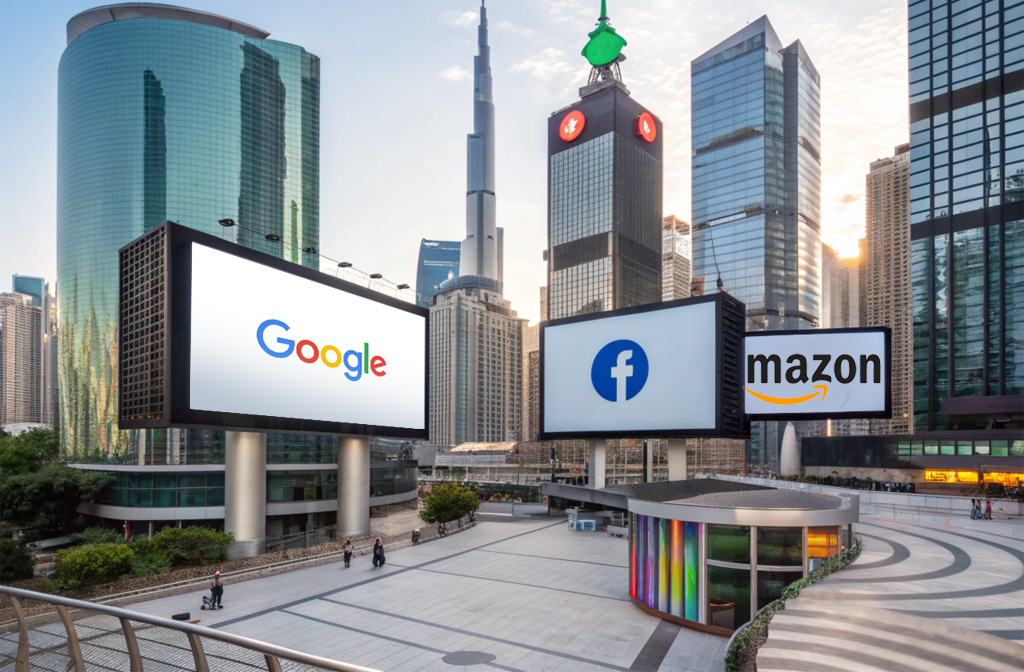
Marketing Lessons from Donald Trump: Strategies to Turn Your Brand into an Unforgettable Powerhouse
Donald Trump, a figure who divides opinions, has demonstrated a highly effective marketing approach that can be analyzed and leveraged by brands seeking visibility, loyalty, and relevance in a competitive market. The tactics he used in his campaigns not only attracted millions of followers but also turned his name into an omnipresent brand. This article breaks down his marketing strategies and how companies, with the help of MarkLovers, can apply them ethically and effectively to strengthen their positioning and connect with their audiences.
Polarization as an Engagement Strategy
From the start of his campaign, Trump chose polarization as a strategy. His controversial messages generated massive engagement, creating a “love or hate” effect that kept his name on everyone’s lips. This technique, though risky, succeeded in capturing the attention of diverse audiences and maintained his constant relevance in the media.
Lesson for brands: A brand that dares to challenge the status quo can become memorable. It’s not about being controversial for the sake of it but about taking a clear and bold stance on issues that resonate with the company’s identity and values. For instance, Nike took a firm stance on social justice issues with its Colin Kaepernick campaign, which, although controversial, deepened its connection with its target audience and strengthened its market position. MarkLovers suggests that companies identify relevant topics within their industry where they can establish a genuine and brave position, helping to build a committed and loyal audience.
Consistent Presence and Frequency
Trump never let his audience forget him. His constant presence on social media, in the news, and at events created a never-ending stream of messages. This frequency kept his narrative fresh and relevant in the public’s mind.
Lesson for brands: Consistency in communication is essential. Brands like Coca-Cola and McDonald’s exemplify how a continuous market presence strengthens brand identity and maintains relevance. MarkLovers recommends structuring a high-frequency content plan across multiple channels: social media, emails, blogs, and events. This consistent presence keeps the brand top of mind for customers, increasing the likelihood of being considered during purchasing decisions.
Strategic Use of Social Media
Trump transformed Twitter into his primary platform for shaping narratives and connecting directly with his audience. His direct, sometimes provocative style reinforced the perception of authenticity among his followers. Today, social media is a vital medium for communicating messages immediately and directly, allowing brands to interact with their audiences in real time.
Lesson for brands: Establishing a primary social channel and using it for genuine interaction can strengthen audience connections. A good example is Wendy’s Twitter strategy, where the brand engages with humor and personality, becoming a leader in its sector. MarkLovers suggests that brands use social media not only to post content but also to create direct communication channels, responding and fostering interactions quickly and authentically. This not only builds engagement but also allows brands to shape their perception in real-time.
Building Community and Loyalty
One of Trump’s greatest achievements was building an incredibly loyal base of followers who supported him unconditionally. This loyalty was fueled by a sense of belonging and the symbols associated with his campaign, such as hats, slogans like “Make America Great Again” and “America First,” and other rituals.
Lesson for brands: Building a strong community around the brand is crucial for fostering loyalty. Apple, for example, has cultivated a group of loyal users who not only buy its products but also promote and defend the brand. MarkLovers recommends that companies create symbols and rituals that generate a sense of belonging among their customers. This can be achieved through exclusive events, behind-the-scenes content, or creating exclusive products or services for members. A well-structured community’s loyalty can turn customers into brand ambassadors, helping its growth and strengthening its market presence.
Provocative and Strategic Communication
Trump used provocative messages to capture attention and dominate the news cycle. However, this strategy can be a double-edged sword, as it can both elevate a brand’s visibility and harm its reputation.
Lesson for brands: Provocation should be used strategically and with a clear purpose. A good example is Benetton’s campaigns in the 1990s, which used provocative images to address social issues and spark conversations. MarkLovers suggests that brands employ this type of communication responsibly and only when aligned with their values and business objectives. Provocation can increase visibility and engagement, but it must be executed precisely to avoid damaging public perception.
Memorable and Consistent Slogans
Trump consistently used slogans like “Make America Great Again” and “America First” throughout his campaign. These simple, easy-to-remember slogans encapsulated his vision and became a fundamental part of his identity.
Lesson for brands: A clear and memorable slogan can be a powerful tool to consolidate a brand’s value proposition. Slogans like Nike’s “Just Do It” or Apple’s “Think Different” demonstrate the impact a good slogan can have on public perception. MarkLovers works with clients to develop effective slogans that are simple, impactful, and capable of conveying the essence of the brand clearly and concisely. These slogans become the core of communication and strengthen brand identity.
Conclusion: Strategies to Apply Ethically and Responsibly
Donald Trump’s marketing strategies teach us the importance of having a clear vision and being consistent in communication. However, these tactics must be applied ethically and in alignment with the company’s values. At MarkLovers, we understand that every brand is unique and has different needs. Our team works to adapt these strategies in ways that resonate with each client’s identity, generating impact and strengthening customer loyalty toward the brand.
If your company seeks to elevate its presence and connect more deeply with its audience, discover how MarkLovers can help you. Visit us at www.marklovers.com.
References
6 Lessons from Donald Trump’s Winning Marketing Manual – Harvard Business School
Donald Trump’s Marketing Strategy – Scripted
Lessons from Donald Trump’s 2016 Campaign Marketing – LinkedIn,
The Regulation of Big Tech and Its Impact on B2B Digital Marketing: Adapting to Win in a New Landscape
The tech industry, led by giants like Google, Facebook, and Amazon, is facing increasingly stringent regulations. These laws are reshaping the landscape for B2B companies that rely on these platforms to connect with their audiences. With new rules on privacy, transparency, and content moderation, B2B digital marketing is undergoing a transformation, making it essential to adapt to continue standing out in an increasingly regulated environment.
Data Privacy: An Obstacle or an Opportunity?
Data Privacy Regulations: An Obstacle or an Opportunity?
Regulations like the GDPR in Europe and the CCPA in California impose limits on the collection and use of data, directly affecting B2B companies that rely on precise segmentation for their campaigns. Instead of viewing these regulations as a barrier, businesses can use them to strengthen their relationship with customers by promoting transparent privacy practices and building user trust. Adhering to these standards can make a company appear more trustworthy, a valuable asset in the B2B world.
Transparency and Ethics: Gaining Customer Trust
The lack of clarity in digital platform algorithms has faced heavy criticism. Regulations like the Digital Services Act (DSA) in the European Union require greater transparency in how ads and content are managed and displayed. This context presents an opportunity for B2B companies to earn customer trust by demonstrating a genuine commitment to ethics and transparency. If your brand embraces honest and clear practices in handling data and algorithms, it can forge a trust bond that is hard to break in such a competitive market.
Content Moderation: The New Challenge on Social Media
With stricter content moderation policies, social media platforms are limiting the type of messages companies can share, especially when dealing with sensitive topics. This means B2B companies must be increasingly precise and strategic in their campaigns. Avoiding controversial areas and complying with platform policies is essential to maintaining a positive public image and adhering to evolving content regulations.
Strategies to Navigate the New Regulatory Landscape
In response to this changing environment, here are some key actions for B2B companies to adjust their digital marketing strategies:
1. Transparency in Data Collection: Ensure users understand and have control over how their information is used. Besides complying with the law, this reinforces the brand’s credibility.
2. Explore New Platforms and Channels: As Big Tech faces increasing restrictions, diversifying platforms is a smart strategy. Alternatives like email marketing and webinars allow more direct control over data and messaging.
3. Review Advertising Messaging: Precision in messaging is key in the current context. Campaigns should be carefully reviewed to comply with all regulations, while maintaining communication aligned with the brand’s ethical image.
4. Integrate Social Responsibility into Marketing Strategy: More companies are valuing the social commitment of brands. This approach can strengthen connections with customers, making the company stand out for its responsibility in the market.
Conclusion: Transformation for Ethical and Transparent Marketing
B2B digital marketing is at a turning point, and companies that adapt to these new rules will not only avoid legal risks but also strengthen their reputation. Ethics, transparency, and responsibility in data management are now more than differentiators; they are essential elements for earning customer trust and loyalty in an increasingly regulated digital world. Adapting swiftly and responsibly not only ensures compliance but also creates B2B digital marketing that resonates with the values and expectations of today’s audiences.
B2B Marketing Trends for 2025: What Businesses Need to Consider to Compete
B2B Marketing Trends for 2025: What Businesses Need to Consider to Compete
B2B marketing is changing rapidly, driven by technological innovations and shifts in customer expectations and the market. By 2025, companies looking to stand out will need to implement new strategies and tools. Here are some trends that will influence B2B marketing in the coming years.
Automation with Advanced Personalization
Automation will solidify its role as a key foundation of B2B marketing, evolving beyond mere operational efficiency to integrate with personalization. New automation platforms will enable companies to design more specific, segmented interactions throughout the customer journey, fostering greater engagement and higher conversion rates.
The Potential of Artificial Intelligence and Machine Learning
Artificial Intelligence (AI) and Machine Learning (ML) will continue to drive B2B marketing. These technologies will allow for deeper predictive analytics, campaign optimization, and real-time personalized content. AI will help with more precise segmentation, improving advertising and anticipating customer needs. Additionally, AI-powered chatbots will continue to enhance the customer experience with fast, personalized responses.
Rising Interactive and Visual Content
B2B buyers are increasingly valuing interactive and visual content. By 2025, companies are expected to increase their investment in formats like videos, dynamic infographics, and augmented reality (AR) experiences to facilitate the understanding of complex products and services. These interactive resources will not only capture attention but also promote greater retention and interest.
Sustainability: A Key Decision Factor
Sustainability is becoming an increasingly important priority for B2B customers. By 2025, companies will need to be transparent about their environmental practices and communicate them effectively. Brands that manage to integrate sustainability into their value proposition will win the preference of customers committed to ecological responsibility.
The Evolution of Social Selling
Social selling will solidify as an essential practice. LinkedIn, Twitter, and other professional networking platforms will remain key tools for building relationships and facilitating sales. Through relevant content and direct contact, sellers will be able to generate trust and build authentic relationships with decision-makers.
AR and VR to Enhance Customer Experience
Augmented Reality (AR) and Virtual Reality (VR) technologies are becoming increasingly popular and will allow B2B companies to offer more immersive product demonstrations. These tools will enhance the buying experience, especially for complex products or services, and facilitate more impactful presentations.
Micro-Influencers in the B2B Environment
Specialized micro-influencers are gaining popularity in B2B marketing. These influencers, with niche audiences, offer credibility and connection with specific sectors. By 2025, turning to industry experts and authority figures will be an increasingly common practice to amplify brand messages and generate quality leads.
Omnichannel Strategies to Improve Customer Experience
For B2B customers, the brand experience must be consistent and seamless across multiple channels. In 2025, integrating digital and physical channels will be essential to provide a smooth, high-quality experience at every touchpoint, which will be critical for attracting and retaining customers.
Video Marketing: An Expanding Tool
Video marketing will remain a powerful communication tool. Companies will not limit themselves to traditional tutorials but will expand their use to live streaming, events, and expert interviews. The use of personalized videos to show how products meet each customer’s needs is also expected to increase.
Data Privacy and Compliance with Regulations
Compliance with data privacy laws will become increasingly important. Companies will need to comply with regulations such as GDPR and local privacy laws, and transparency in data collection and usage will be critical to gaining customer trust.
Conclusion
By 2025, B2B companies that successfully adapt to these new trends will be better positioned to compete and thrive. The key will be adopting advanced technologies, integrating sustainability values, and maintaining a customer-focused approach to stand out in an increasingly demanding and evolving market.
¿Ready to Transform Your Business?
B2B eCommerce is no longer just a trend; it is a necessity for companies looking to innovate and stay competitive in a global market. If you haven’t made the leap yet, it’s time to consider how this approach can transform your business model and increase your revenue.
At MarkLovers, we are here to help you design a B2B eCommerce strategy that perfectly fits your company’s needs. From creating customized platforms to developing digital marketing strategies that will boost your online presence, our team of experts will guide you every step of the way.
Contact us now and discover how we can help you revolutionize your business with B2B eCommerce.



